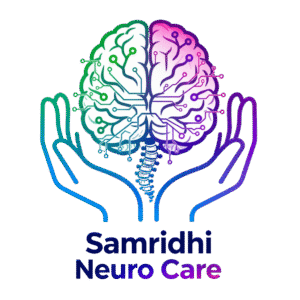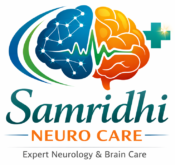Neurological Conditions Treatment at Samridhi Neuro Care
Understanding Your Neurological Health
At Samridhi Neuro Care, we understand that neurological symptoms don’t just affect the body—they affect confidence, independence, family life, and peace of mind. Symptoms like headaches, tremors, memory loss, seizures, or weakness can be frightening, especially when answers are unclear.
Led by Dr. R K Srivastava, a senior neurologist with over 25 years of clinical experience, our clinic is dedicated to providing clear diagnosis, honest explanations, and personalized neurological care—right here in Gorakhpur.
We strongly believe that listening carefully is just as important as medical testing. Every patient is evaluated thoroughly, without hurry, and with respect.
Learn about our approach on the Home Page or read more about Dr. Srivastava on the About Page.
A Wide Range of Neurological Conditions We Treat
Neurological disorders can present in many ways—pain, weakness, imbalance, memory issues, or behavioral changes. At Samridhi Neuro Care, we diagnose and manage both common and complex neurological conditions across all age groups.
Headache & Migraine Disorders
When Pain Becomes a Daily Struggle
Headaches are often dismissed as “normal,” but recurring or severe headaches may indicate an underlying neurological issue.
We treat:
Migraine (episodic & chronic)
Tension-type headaches
Cluster headaches
Post-traumatic headaches
Medication-overuse headaches
Migraines are not “just headaches.” They involve complex brain mechanisms and can include nausea, vomiting, light sensitivity, and visual disturbances.
Our care focuses on:
Identifying triggers
Preventive treatment to reduce frequency
Acute pain control
Lifestyle and sleep guidance
Many patients experience significant improvement when migraines are treated scientifically rather than symptomatically.
Neck Pain, Back Pain & Sciatica
When Pain Travels Along Nerves
If your neck or back pain spreads to your arms or legs, or is associated with numbness or weakness, the problem may be neurological rather than muscular.
Conditions we manage include:
Slipped disc (cervical & lumbar)
Sciatica
Nerve compression syndromes
Radiculopathy
Using clinical examination, imaging, EMG, and nerve conduction studies, we identify the exact source of pain and tailor treatment accordingly—often avoiding unnecessary surgery.
Epilepsy & Seizure Disorders
Reclaiming Life Without Fear
Epilepsy can affect anyone—children, adults, or the elderly. Unfortunately, stigma and misinformation still surround seizures.
At Samridhi Neuro Care, epilepsy is treated with precision and empathy.
We manage:
Generalized seizures
Focal seizures
Childhood epilepsy
Recurrent unexplained blackouts
With accurate diagnosis using EEG and Video EEG, most patients achieve excellent seizure control and return to normal daily activities.
Parkinson’s Disease & Movement Disorders
Supporting Mobility, Confidence & Independence
Movement disorders gradually affect daily life—walking, speaking, writing, or even facial expressions.
Conditions treated:
Parkinson’s disease
Tremors
Dystonia
Hemifacial spasm
Blepharospasm
Treatment is not only about medication—it’s about timing, balance, physical activity, and long-term planning. Our goal is to help patients remain active and independent for as long as possible.
Memory Loss, Dementia & Alzheimer’s Disease
Early Answers Make a Difference
Memory problems can be deeply distressing for both patients and families. Forgetfulness should never be ignored.
We evaluate:
Age-related memory decline
Dementia
Alzheimer’s disease
Cognitive impairment
Early diagnosis allows us to slow progression, maintain independence, and guide families with realistic expectations and support.
Neuropathy & Neuromuscular Disorders
Understanding Numbness, Weakness & Burning Pain
Damage to nerves or muscles can cause chronic discomfort and disability.
We diagnose and treat:
Diabetic neuropathy
Peripheral neuropathy
Myasthenia gravis
Muscle disorders (myopathies)
Using EMG, nerve conduction studies, and blood tests, we identify reversible causes wherever possible and focus on symptom relief and function preservation.
Stroke Care, Paralysis & Recovery
Beyond Emergency—Toward Rehabilitation
Stroke is a life-changing event, but recovery does not stop after hospital discharge.
Our role includes:
Stroke risk evaluation
Post-stroke neurological follow-up
Paralysis assessment
Facial palsy (Bell’s palsy)
Early rehabilitation planning and prevention of recurrence are central to long-term outcomes.
Vertigo, Dizziness & Balance Disorders
When the World Feels Unstable
Dizziness can be disabling and frightening, especially when it occurs suddenly.
Common causes treated:
BPPV (Benign Paroxysmal Positional Vertigo)
Vestibular disorders
Migraine-related dizziness
Neurological balance issues
Many cases improve dramatically once the correct cause is identified.
Sleep Disorders & Insomnia
Rest Is Essential for Brain Health
Poor sleep affects memory, mood, immunity, and concentration.
We manage:
Chronic insomnia
Restless leg syndrome
Sleep-related neurological disorders
Addressing sleep issues often improves overall neurological health.
Pediatric Neurology
Gentle, Careful Evaluation for Children
Children require a different, sensitive approach.
We treat:
ADHD
Autism spectrum disorder
Developmental delays
Childhood seizures
Parents are guided at every step with clarity and reassurance.
Brain Infections & TBM
Conditions That Require Urgent Expertise
Neurological infections must be identified early to prevent long-term damage.
We manage:
Tuberculous meningitis (TBM)
Encephalitis
Meningitis
Timely diagnosis and proper treatment can be life-saving.
Advanced Diagnostic Facilities
Accurate diagnosis is the foundation of effective treatment. We use modern neurological investigations including:
EEG & Video EEG
EMG
Nerve Conduction Studies
BERA
VEP
ECG
Brain & Spine Imaging (CT/MRI referrals)
Why Patients Trust Samridhi Neuro Care
25+ years of neurological experience
Former Assistant Professor at SGPGI, Lucknow & BRD Medical College, Gorakhpur
Ethical, evidence-based treatment
Clear explanations without medical jargon
Respect for patient time and concerns
Book Your Appointment
If you are experiencing headaches, seizures, weakness, memory loss, dizziness, or any neurological concern, early evaluation can change outcomes.
Call to Book Appointment: 8853631811
Email: samridhineurocare@gmail.com
Clinic Timings:
Monday-Wednesday:12:00 PM – 6:00 PM
Thursday: Closed
Friday-Sunday:12:00 PM – 6:00 PM
Address:
Samridhi Neuro Care
LG-9, Saket Enclave, Rajendra Nagar E Rd,
Below KFC, Dayanand Nagar,
Gorakhpur, Uttar Pradesh – 273015

Dr. R K Srivastava
Samridhi Neuro Care
Dr. R K Srivastava
Hey, how can I help you today?
Powered by Elementor
